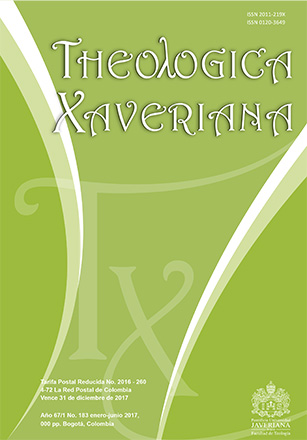Abstract
Based on the environmental thought of the Patriarch of Constantinople, we study the importance of considering the environmental issues and crisis in the light of a conceptualization that emphasizes the significance of the ontological argument, as a key category of meaning for environmental thought. The Patriarch Bartholomew has developed a rich environmental argument related with the theological, spiritual and religious foundations of Christianity. A rich environmental argumentation and deep meanings provided by Orthodox Theology in understanding the causes and solutions of moderm environmental issues stand out as the result of this research.
Barthes, Roland. La aventura semiológica. Buenos Aires: Paidós, 1993.
Cárdenas, Felipe. “Categorías y códigos discursivos del cristianismo en su proceso de adaptación humana a la crisis ambiental”. En La sacralidad de la vida en una Tierra habitable para todos. Documentos y presentaciones del viii Congreso Latinoamericano de Ciencia y Religión (20, 21 y 22 de octubre de 2014), editado por Silvia Alonso, 78-99.
Puebla: Fundación Diálogo entre Ciencia y Religión, Universidad Popular Autónoma del Estado de Puebla, Instituto “Elie Wiesel”-Seminario Rabino Latinoamericano “Marshall T. Meye”, 2015.
_____. “Crisis ambiental y cristianismo”. Teología y vida 49-4 (2008): 771-797. Disponible en: Scielo, http://www.scielo.cl/scielo.php script=sci_arttext&pid=S0049- 34492008000300011&lng=es&tlng=es. 10.4067/S0049-34492008000300011 (consultado el 12 de febrero de 2016).
_____. “Narrativa ambiental del patriarca Bartolomé. Aportes del patriarca ecológico”. En Vida Nueva. Una palabra comprometida en la Iglesia 132 (2015): 23-30.
_____. “Signos de la teología mística de la Iglesia de Oriente. Vladimir Lossky a la luz de la teoría semiótica de Charles Sanders Peirce”. Theologica Xaveriana 178 (2014): 353-391.
Eliade, Mircea. El chamanismo y las técnicas arcaicas del éxtasis. México: Fondo de Cultura Económica, 1986.
_____. El mito del eterno retorno. Barcelona: Planeta-Agostini, 1984.
_____. Mito y realidad. Barcelona: Labor, 1983.
_____. Yoga, inmortalidad y libertad. Buenos Aires: Leviatán, 1954.
Felmy, Karl Ch. Teología ortodoxa actual. Salamanca: Sígueme, 2002.
Florio, Lucio. Mapa trinitario del mundo. Actualización del tema de la percepción del Dios trinitario en la experiencia histórica del creyente. Salamanca: Secretariado Trinitario, 2000.
Foltz, Bruce B. The Noetics of Nature: Environmental Philosophy and the Holy Beauty of the Visible. New York: Fordham University Press, 2014.
Francisco. Carta encíclica Laudato si’ sobre el cuidado de la casa común. Bogotá: Paulinas, 2015.
Gehlen, Arnold. Antropología filosófica: del encuentro y descubrimiento del hombre por sí mismo. Buenos Aires: Paidós, 1993.
Kay, Jay. “Concepts for Nature in the Hebrew Bible”. Environmental Ethics 10, 4 (1988): 309–327.
Lossky, Vladimir. Teología mística de la Iglesia de Oriente. Barcelona: Herder, 1982.
Maximus, confessor. On difficulties in the Church Fathers: The Ambigua. Cambridge (MA): Harvard University Press, 2014.
Nesteruk, Alexei. Light from the East: Theology, Science, and the Eastern Orthodox Tradition. Minneapolis (MN): Fortress Press, 2003.
Pannenberg, Wolfhart. Antropología en perspectiva teológica. Salamanca: Sígueme, 1993.
Passmore, John. Man’s Responsibility for Nature: Ecological Problems and the Western Traditions. New York: Charles Scribner and Sons, 1974.
Prior, Michel, C. M. La Biblia y el colonialismo. Una crítica moral. Buenos Aires: Canaán, 2005.
Rappaport, Roy. Ritual y religión en la formación de la humanidad. Madrid: Cambridge University Press, 2001.
Rusch, William (ed.). The Witness of Bartholomew I, Ecumenical Patriarch. Cambridge (MA): Wm.B. Eerdmans Publishing Co., 2013.
Sherkat, Darren y Christopher, Ellison. “Structuring the Religión-Environment Connection: Identifying Religious Influences on Environmental Concerning and Activism”. Journal for the Scientific Study of Religión 46, 1 (2007): 71-85.
Spiteris, Yannis. Eclesiología ortodoxa. Salamanca: Secretariado Trinitario, 2004.
Theokritoff, Elizabeth. “Creator and Creation”. En The Cambridge Companion to Orthodox Christian Theology, editado por Mary B. Cunningham y Elizabeth Theokritoff, 63-77. Cambridge (U.K.): Cambridge University Press, 2008.
Weber, Max. La ética protestante y el espíritu del capitalismo. México: Fondo de Cultura Económica, 2003.
White, Leslie. “The Historical Root of our Ecological Crisis”. Science 155 (1967): 1203-1207.
Yannaras, Christos. Postmodern Metaphysics. Brookline (MA): Holy Cross Orthodox Press, 2004.
_____. Relational Ontology. Brookline (MA): Holy Cross Orthodox Press, 2011.
_____. The Meaning of Reality. Essays on Existence and Communion, Eros and History. Los Angeles (CA): Sebastian Press, 2012.
Zizioulas, John. Being as Communion. Yonkers (NY): St. Vladimir´s Seminary Press, 1985.
This journal is registered under a Creative Commons Attribution 4.0 International Public License. Thus, this work may be reproduced, distributed, and publicly shared in digital format, as long as the names of the authors and Pontificia Universidad Javeriana are acknowledged. Others are allowed to quote, adapt, transform, auto-archive, republish, and create based on this material, for any purpose (even commercial ones), provided the authorship is duly acknowledged, a link to the original work is provided, and it is specified if changes have been made. Pontificia Universidad Javeriana does not hold the rights of published works and the authors are solely responsible for the contents of their works; they keep the moral, intellectual, privacy, and publicity rights.
Approving the intervention of the work (review, copy-editing, translation, layout) and the following outreach, are granted through an use license and not through an assignment of rights. This means the journal and Pontificia Universidad Javeriana cannot be held responsible for any ethical malpractice by the authors. As a consequence of the protection granted by the use license, the journal is not required to publish recantations or modify information already published, unless the errata stems from the editorial management process. Publishing contents in this journal does not generate royalties for contributors.



